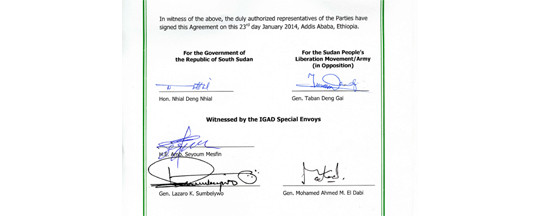The warring parties in South Sudan have signed an immediate Cessation of Hostilities (CoH), which will come into effect tomorrow, Friday, 24 January. The monitoring of the agreement has not been arranged yet. Both parties also have different explanations surrounding the release of the 11 political detainees.
The signed agreement says: parties will ‘undertake every effort to expedite the release of the detainees’. The Juba government says the investigation of the detainees will continue. However, the opposition forces assume the detainees will take part in the next round of negotiations, due to start on 7 February. The negotiator for the Intergovernmental Authority on Development (IGAD), General Mohamed Ahmed M El Dabi, said the parties have indeed not reached a specific agreement on the detainees. The agreement only asks the government of South Sudan to release the detainees. But no date has been stipulated in the agreement.
Taban Deng Gai, chief negotiator on behalf of the opposition forces led by former vice president Riek Machar expects that the detainees will be released within a week, he told Radio Tamazuj. The spokesman on behalf of the South Sudan government, Michael Makuai, however, said the government is continuing its investigations and will not release the detainees before having seen the results.
IGAD mediator Seyoum Mesfin, said the agreement on the CoH and the question of the detainees is only “a successful beginning of the peace process”. He said the post-war struggle will be more difficult than the war itself. He urged for an all-inclusive process. “This is unique; please do not squander it”, Mesfin emphasised.
‘Successful beginning’
The Cessation means that the parties are formally committed to cease all military operations and freeze their forces at their current positions. They will have to refrain from any actions that could lead to military confrontations including all movement of forces, ammunition resupply, or any other action that could be viewed as confrontational. They have to ensure that all forces or armed groups under their influence, control, and command shall observe this Agreement. Forces or armed groups under their control must be disengaged. The parties must cease hostile media and other propaganda campaigns, and humanitarian access will be granted to all parts of the country.
The involvement of Ugandan army has not been solved. According to the opposition, Uganda should immediately withdraw from South Sudan, while Juba regards the agreement as the withdrawal of Ugandan troops from the battlefield.
The monitoring of the CoH will be carried out by observers from countries in the region on behalf of IGAD. A technical committee will start with a workshop in Addis Ababa and will go to South Sudan. It will form two teams; one will have a base in government-controlled areas and one in those areas controlled by opposition forces.
The official text has not yet been released, but will be presented on Friday at a press conference.
Picture: The signatures of all parties on the Cessation of Hostilities




